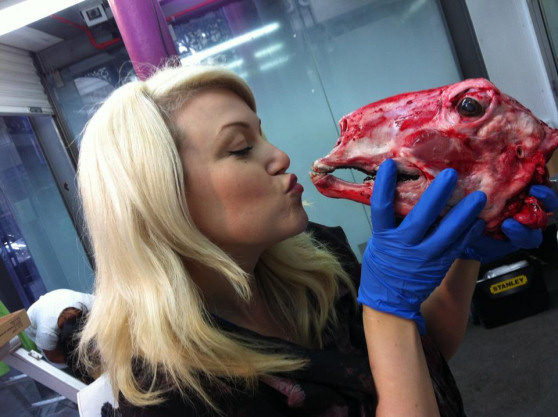Gamers aren’t the only ones interested in the new Resident Evil 6 from Capcom — academics are dissecting its secrets, too.
Last weekend, London’s famous Smithfield Market opened a fake human butchery called “Wesker and Son” to the public, but the festivities didn’t end there. St. Bartholomew’s Pathology Museum (@BartsPathology on Twitter) held special lectures in honor of the game, which releases worldwide today. But as always with Resident Evil, the agenda is bigger than you think.
“The point of this aspect of the Resident Evil 6 launch was to give the general public more of an understanding of the science behind the game,” Carla Connolly (pictured above), the technician at the museum, told GamesBeat. “It was a way to demystify ‘difficult’ topics that some people may not delve into by choice for fear of them being too complicated.”
 Those topics included Virology and Parasitology, among others. “Andrew Voak — a Queen Mary, University of London PhD candidate — gave the first lecture about Parasitology and tied this into the concept of Resident Evil 6 perfectly. He’s been a fan since the first game was released. He was able to make people aware of the link between fact and fiction and also tell interesting anecdotes about parasites many people never knew actually [existed].”
Those topics included Virology and Parasitology, among others. “Andrew Voak — a Queen Mary, University of London PhD candidate — gave the first lecture about Parasitology and tied this into the concept of Resident Evil 6 perfectly. He’s been a fan since the first game was released. He was able to make people aware of the link between fact and fiction and also tell interesting anecdotes about parasites many people never knew actually [existed].”
Another speaker was John Oxford, a professor of Virology at Queen Mary’s School of Medicine and Dentistry, who has lended his expertise to subjects such as the film 28 Days Later. He’s “always happy to be involved in new and exciting projects that discuss science from a totally different perspective,” said Connolly.
She said, “We’re hoping that the general public will see science as a more accessible topic and understand that it permeates many aspects of popular culture. It’s not just for old men in tweed suits or ‘Big Bang Theory’ geeks!”
Connolly is personally a fan of the survival horror series, as well as Silent Hill and Fatal Frame (known as Project Zero in Europe). “[Resident Evil] has such a cult following now that it’s impossible to find someone who doesn’t know what it is, at the very least,” she said.
Well, maybe not impossible. One of the other speakers at St. Bart’s, food futurologist Dr. Morgaine Gaye, admitted to us by phone, “I don’t know one thing about Resident Evil 6.” Her lecture wasn’t about the game itself but rather about one of its real-life contexts: meat.
 “I write about trends,” she said, when asked what a food futurologist does. “I look at the future of food … at geopolitics, economics, and ecology — what we’re going to be doing in the future in relation to our lives, really, and that always involves food.”
“I write about trends,” she said, when asked what a food futurologist does. “I look at the future of food … at geopolitics, economics, and ecology — what we’re going to be doing in the future in relation to our lives, really, and that always involves food.”
While Dr. Gaye didn’t talk about zombie apocalypses, she did share a few details about abattoirs (or slaughterhouses) and cannibalism in her lecture last Friday.
“It was supposed to give Resident Evil some academic underpinning and kudos, rather than it being, ‘Hey, this is just a game,'” she said. “It’s about looking at … the truth of science. And I found that most people were very disturbed by my lecture, as I would imagine that a lot of people playing Resident Evil probably are disturbed by Resident Evil. They play because they think, ‘Oh my god, oh my god.’ And I think what I talked about left people with that feeling because there’s nothing more weird than the truth. And when I talked about cannibalism, and I said, ‘You know, we think that we’re human. We would never do that. Oh my goodness, we would never do that.’”
Dr. Gaye showed her audience pictures of an excited group of people drawing and quartering a live pig and people in China dissecting a human torso with a scythe — to which she asked, “How far away are we?
“We’re the most overpopulated country in Europe, with the smallest land mass per person. We’re very populated. And people are never left in the ground for more than 100 years here. They’re actually dug up, and the next body’s put in the ground because we just don’t have the space. So maybe we can cure that by eating people. And I just left that as a question.”
That kind of horror isn’t far from the apocalyptic nature of Resident Evil. As Dr. Gaye said, what’s considered “normal is [only] what we’re doing right now.”
(Photos courtesy of Carla Connolly)

